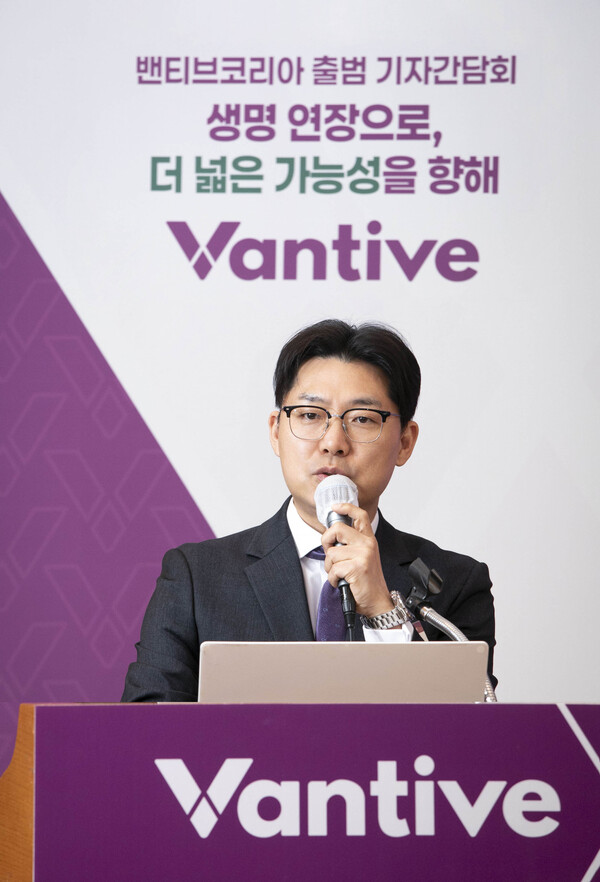In Korea, where one in nine adults has chronic kidney disease (CKD) and end-stage kidney disease (ESKD) is growing faster than anywhere else, Baxter spinoff Vantive is betting that a singular focus on organ failure could drive its next chapter.
“We can finally focus,” said Vantive Korea General Manager Im Kwang-hyuk, who spoke Wednesday at a press conference in Seoul. Spun out from Baxter in February, the newly independent company plans to double down on kidney care while expanding into liver and lung failure treatments.
“Under Baxter’s diversified business structure, we operated across many different sectors, which made it difficult to concentrate R&D investments on any single area,” Im said. “Now, as a company specializing in kidney and vital organ care, we can focus on more differentiated, targeted R&D. We believe this will allow us to bring new innovations to market more efficiently—and ultimately help more patients.”
While he declined to disclose specific product pipelines, Im said the company is “actively gathering R&D ideas from across its global network”—including direct feedback from clinicians on unmet needs and potential product improvements.

That innovation push extends beyond dialysis. While Im said Vantive’s current offerings still mirror Baxter’s renal portfolio, the company is preparing to move into broader critical care. One key area is continuous renal replacement therapy (CRRT), a slow, steady form of dialysis used in intensive care for patients with multi-organ failure, including sepsis-related complications.
The pitch comes at a time when Korea is confronting the financial weight of kidney disease. Total healthcare spending on CKD now tops 2 trillion won ($1.4 billion) annually. A single patient with ESKD can rack up more than 30 million won in annual costs—making it the most expensive condition in Korea on a per-patient basis. According to data presented by Im, the country had roughly 140,000 ESKD patients in 2023, up 2.3-fold over 13 years.
“Dialysis is life support, not just treatment,” said Kim Yong-chul, a professor of nephrology at Seoul National University Hospital (SNUH), adding that the kidney remains the only organ whose function can be fully replaced by therapy alone. “Without it, death comes in days, not years.”
The company is backing peritoneal dialysis (PD)—a home-based alternative to hospital-bound hemodialysis—as one path to better care. That includes automated peritoneal dialysis (APD), which allows patients to undergo treatment overnight while they sleep. Vantive’s APD systems, combined with its Sharesource digital patient management platform, let clinicians remotely monitor real-time dialysis data, while patients track their own health through a mobile app.
That approach aligns with Korea’s ongoing pilot program for home-based PD, which aims to shift treatment out of hospitals to reduce both costs and patient disruption—though uptake has declined in recent years.
As Korea Biomedical Review reported last month, PD uptake in Korea remains sluggish—held back by weak provider incentives, limited infrastructure, and patient anxiety around self-management. “The biggest hurdle is a sense of uncertainty,” said Professor Kim Jwa-kyung of Hallym University Sacred Heart Hospital. “They don’t know if they’re doing it right.”
Vantive is stepping in to fill the gaps. The company said it will expand support services—including 24/7 call centers, home delivery of dialysis fluids, and awareness campaigns—to make PD more accessible and less intimidating for patients and providers alike.
“We’re enhancing patient-centered care by offering around-the-clock consultation and delivering dialysis solutions directly to patients’ homes,” Im said, adding that Vantive will also expand its social initiatives, such as pediatric kidney camps and public education programs on ESKD.
“Let’s say a soldier develops ESKD from diabetes. If they start hemodialysis, they’ll likely have to retire—there’s no way to serve in remote areas while tethered to a dialysis chair three times a week,” said Professor Kim of SNUH, who previously served as a military doctor. “But with PD or a transplant, I’ve seen service members continue working. That’s the kind of life impact we’re talking about.”
Related articles
- Sudden drop in urine output? It could be acute kidney failure
- Korea faces decline in peritoneal dialysis adoption despite growing global trend
- Korea moves to expand home healthcare, as study shows pilot programs are effective
- Viatris, Pfizer, Vantive cut jobs in Korea
- Vantive Korea debuts following Carlyle's acquisition of Baxter's kidney care unit
- Baxter launches Progressa ICU bed in Korea with early rehab features
- Baxter updates home peritoneal dialysis management app MyPD
- Baxter launches ‘MyPD,’ a digital management app for peritoneal dialysis patients
- Medtronic's drug-coated balloon for dialysis patients to be reimbursed in Korea starting May
- ‘Early detection of ANCA-associated vasculitis can stop dialysis and prevent lifelong treatment’
- Shingles vaccine crucial to protect kidney patients: expert
- Vantive Korea pushes to boost home peritoneal dialysis use
- 80% of kidney patients call for home peritoneal dialysis to become national program: survey
- Study links peritoneal dialysis to reduced brain connectivity, higher dementia risk

